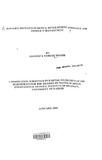| dc.contributor.author | Onuong'a, Yobesh M | |
| dc.date.accessioned | 2013-05-02T06:33:33Z | |
| dc.date.available | 2013-05-02T06:33:33Z | |
| dc.date.issued | 2005 | |
| dc.identifier.citation | M.A (International Studies) 2005 | en |
| dc.identifier.uri | http://erepository.uonbi.ac.ke:8080/xmlui/handle/123456789/18181 | |
| dc.description.abstract | In a world society of complex interdependence the Refugee problem need to be
addressed as an international relations issue that affect state security, foreign policy
choices, development plans and environmental concerns. When human rights are
securitized state representatives claim a special right to use unconventional means to
protect state interests thus depriving citizens basic rights. Security is what takes politics
beyond the rules of the game. Failure to provide for the needs of citizens challenges the
legitimacy anQsovereignty of refugee producing countries that are locked in
dysfunctional conflicts.
This dissertation examines the effectiveness of giving refugees living in Kenya
humanitarian relief that take stock of long term development assistance for capacity
building that will enable them attain self-reliance while in exile and when they return
home. The long-term development assistance strategy aims at stabilizing the socioeconomic
structures of the host country to stem negative responses to the institution of
asylum embracing sustainable development.
Refugees are a vote of no confidence to their government for failing to provide
security to its citizens. Addressing their political causes to enable a dignified return of
refugees and enhance regional stability necessary for development can solve the Somalia
and Sudan conflicts. It is hoped that the people of Somalia and Sudan will give the
concluded peace agreements a chance. This dissertation concludes that conflicts are
caused by elite conspiracy in subjective allocation of national resources and the
unwillingness to share power that is often countered by self -determination struggles to
share territory. The international community has an obligation to oppose crimes against
humanity, share the refugee burden and resolve conflicts through consultative consensus
building procedures so as to reach negotiated settlement, management or resolution of
conflicts that invite all parties to post- conflict reconstruction.
Only then, we people of the world, would have solved the refugee problem and future generations from dysfunctional conflicts. | en |
| dc.description.sponsorship | University of Nairobi | en |
| dc.language.iso | en | en |
| dc.title | Managing refugees in Kenya: Development assistance and conflict management | en |
| dc.type | Thesis | en |
| local.publisher | Faculty of Arts, University of Nairobi | en |

